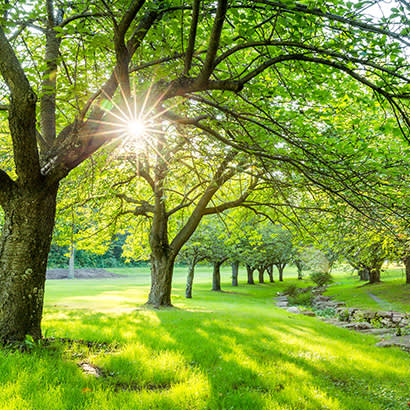
For an enhanced digital experience, read this story in the ezine.
Across the country, there is a push to plant more trees in our cities — especially in our city parks. Ecologically, trees help create wildlife habitat, reduce soil erosion, shade creeks and water bodies to help with temperature regulation, and reduce air temperatures through shading and evaporative cooling. Culturally, we gain the benefits of lower noise levels, increased property values and overall improved economic stability in areas with or near trees. These are just some of the frequently referenced benefits, so what is the rest of the story on trees in our park systems?
Trees are a major focus of Dallas’ Comprehensive Environmental and Climate Action Plan and Urban Forest Master Plan. The Dallas Park System (Dallas Parks) entails more than 400 park properties and more than 175 miles of paved trails. The sheer number of properties and the varying density and species of trees require a professional staff to ensure the various aspects of conservation, safety and maintenance of open space for active recreation are considered in the overall park maintenance. Dallas Parks has an urban biologist, conservation manager, park arborist and city forester — who oversee all tree maintenance with a 30-person work crew — involved in its tree-related maintenance. All hold the International Society of Arboriculture (ISA) Certified Arborist® credential.
Staff training and outreach to various community groups are critical. On a quarterly basis, park staff engage in training to ensure they have the latest tree-related information available. Training has included updates to tree-risk assessments, special wildlife conservation concerns, such as legal nesting issues, proper pruning techniques, and information related to the emerald ash borer, a pest that threatens ash trees. When we cannot provide the training, we partner with organizations, such as the Texas A&M Forest Service, the Texas Trees Foundation or even private companies that specialize in specific tree-care practices.
We are very proud of the department’s tree planting program, Branching Out. Working in partnership with our park maintenance districts, park board members, the Texas Trees Foundation and assorted community groups, the department aims to plant at least 600 30-gallon trees. That is at least two weekend tree plantings per maintenance district within Texas’ prime tree planting season.
Planning and Maintenance
So, what considerations are in place? Can we irrigate or get water to the park site? What tree species are most appropriate for a specific site? If we plant in the available open space, will there be sufficient space for recreation? We are also increasingly looking at tree equity in the area. The Texas Trees Foundation has been working on this effort locally, but American Forests has a simple-to-use online “Tree Equity Score” tool.
But what about our older trees? As the trees mature, the healthiest are those that are properly maintained. This is why training in proper pruning techniques is extremely valuable. Also critical is other maintenance going on around the trees: too little or too much water and mower and line-trimmer damage.
What about the planning and building in your parks? Without proper protection and oversight, construction kills a lot of trees. It is truly hard to mitigate for a fully mature tree once it is lost. Protect what you have. Consider getting a tree inventory in place. That will ensure you can plan your construction, better prepare for fires and prepare for disease or infestations.
Most people want more trees in the ground, but does your staff have the training to properly select, plant and maintain the trees? Can you determine when they are a risk? How can the trees benefit wildlife and people? If your answers do not meet your goals, reach out and get training for your staff. Seek out organizations that may be able to fill gaps in your staffing, expertise and outreach.
Brett Johnson, CWB®, ISA Certified Arborist®, is Conservation Manager at Dallas Park and Recreation Department. Christopher McMaster, ISA Board Certified Master Arborist®, ISA TRAQ, CTSP, CPRP, is City Forester at Dallas Park and Recreation Department.


